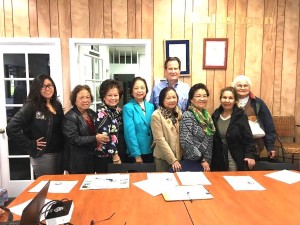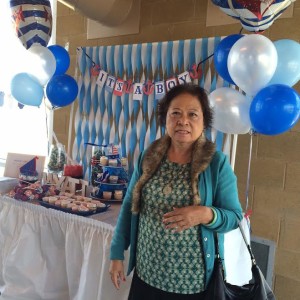‘Eat your Filipino vegetables,’ she tells Fil-Ams
“Knowing and eating Filipino food is important so that they learn to appreciate their culture, especially those who are born here,” explains Dr. Ofelia Dirige, president and founder of Kalusugan+Kalakasan Center for Health and Wellness in San Diego, California.
A lecturer at the Center for Asian Studies and adjunct professor at the Graduate School of Public Health at San Diego State University, Dr. Dirige focuses on the importance of food as a part of the cultural heritage.
Dirige, a Filipino American who has Ilocano roots, says that eating “talbos” (vegetable shoots) does not mean “kuripot” (stingy) and poor; instead she believes that all Filipinos, especially the new generations of Fil-Ams must know the shoots’ nutritional and health benefits.
“When I was in the Philippines many years ago, camote or camote tops was a food of the poor. This is mostly true of the Tagalogs who live in Manila and urban areas. However, the Ilocanos have vegetables as a part of their regular diet. Think about pinakbet, dinengdeng,” she says.
Advocating for indigenous foods
Dirige believes that Fil-Ams will be able to explain their own food and how to eat these to other nationalities. She mentions that the young generations do not know anything about the Filipino foods except those served at home.
“Some of them don’t eat it and even despise it. How can you encourage others to like it if you don’t even eat it,” says Dirige.
Chefs and anyone who prepare food should make it more appetizing and look attractive. She says that many chefs in San Diego are doing that to make the food more palatable and appetizing to the American taste. Unfortunately, she says, Filipino food is construed as the meals served in a famous fast-food chain in Filipino-populated areas in California.
“Look what the Vietnamese, Japanese and Chinese have done with their cooking. The Vietnamese are so new here, but they are more acceptable than Filipino cuisine,” she laments.
Psychology of multiculturalism
Dirige admits that she has lived longer in the United States than in the Philippines, but it does not mean that her “Filipino-ness” is diminished.
Her color and accent make her Filipino, although she has already imbibed the American culture.
“You cannot erase your culture because of your color and accent. But since you are in America you should live as the Americans do; so you become more comfortable dealing with them and acceptable to them,” she reasons.
Teaching cultural identity in Asian Studies, Dirige says that individuals who can accept their biculturalism are the more psychologically stable than ones who either accept just their own culture or become fully Americanized.
“You have to be bicultural to be able to adjust to your environment in this society,” she advices.
Kalusugan for the People
Noticing that many younger Fil-Ams are experiencing health issues such as diabetes, obesity, hypertension, as well as psychological problems, Dirige decided to do something about it. She founded project Kalusugan (Good Health) in 1992 to develop a coalition and conduct a needs assessment of the Fil-Am community. In 1995 it was incorporated and its name was changed to Kalusugan Community Services.
It is a “nonprofit, multiservice organization providing high-quality, professional services by implementing programs that promote health and total wellness through positive changes in lifestyle and the environment, making our community a better place to live,” according to its website (https://kalusugan.org/about/)

Members of the Board of Kalusugan. CONTRIBUTED
Dirige explains that there are eight aspects of wellness: spiritual; social; mental; intellectual; physical; financial; environmental; occupational. These are integrated into one comprehensive program called “Total Wellness: Ganap Na Kalakasan.” It provides health/social information through various channels, chef demonstrations and physical activities, individual counseling, field trips to restaurants and supermarkets, participation in walkathons, networking, learning how to access health care resources and combining art/cultural and wellness activities.
Kalusugan also advocates for the health of other Asians and Pacific Islanders. It also gets involved in social issues such as encouraging Fil-Ams to vote; advocating for veterans’ rights; pushing for ethnic education or Asian studies in college and universities; and others.
The organization collaborates with other national organizations such as NaFFAA (National Federation of Filipino American Associations, local Fil-Am organizations in San Diego like the Council of Fil-Am Organizations, Operation Samahan, SD County Health & Human Services, universities and colleges and mainstream organizations such as American Cancer Society, American Heart Association, San Diego State University (SDSU), University of California San Diego (UCSD) among others.
Health advice
Dirige advices Filipinos to always eat healthy. Healthful foods are not always expensive; some can be planted or found in backyards. Refrain from smoking and drinking excessively, avoid too much exposure to sunlight, practice safe sex or abstain, have regular check-ups and be physically active. Most of all, she stresses that socialization is better for mental health.


